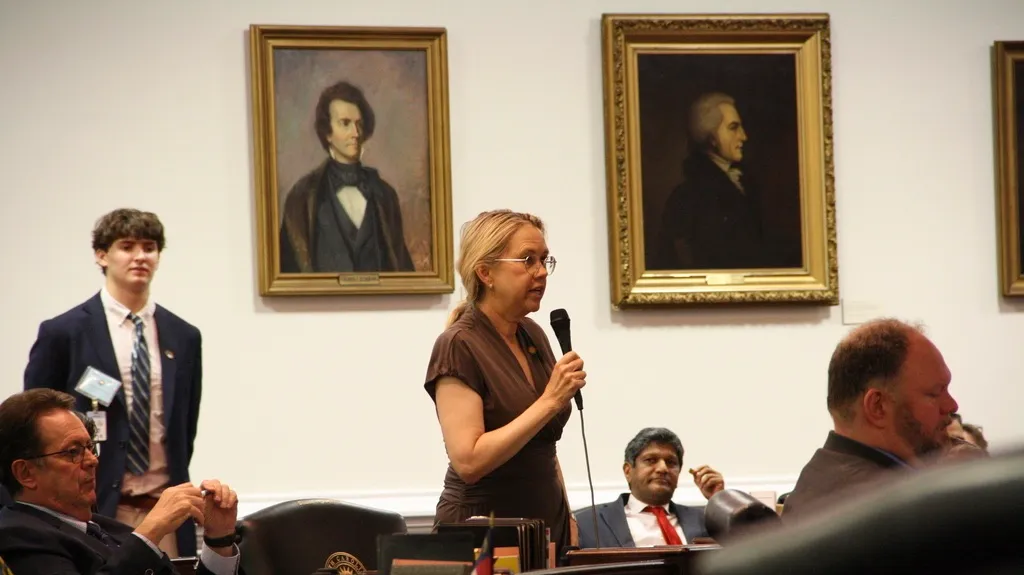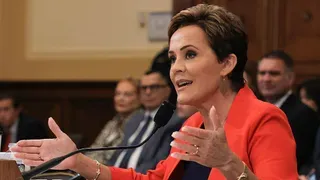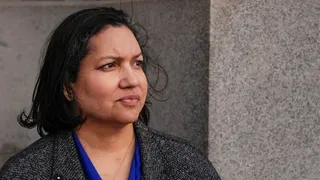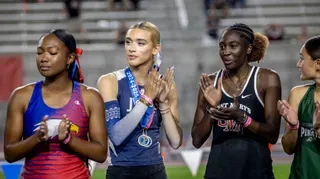November 5, 2012
Whatever the Outcomes, Volunteers & Groups Fought Hard for Marriage Equality
Winnie McCroy READ TIME: 10 MIN.
With Nov. 6, LGBT voters are fully engaged, both with the presidential election but also marriage-equality ballot initiatives in Maine, Maryland, Minnesota and Washington. have prompted local and national organizations to form United for Marriage, a campaign to recruit grassroots in these battleground states.
Leaders from the Human Rights Campaign, the National Gay and Lesbian Task Force, and Freedom to Marry have joined with local organizations to form United for Marriage, which is bringing volunteers to the battleground states. "We are three national organizations working for LGBT equality, and this is a great opportunity to show we are all united in the fight for marriage equality," said HRC Deputy Field Director Jeremy Pittman, who is optimistic of victory in all four states: "The polling looks good with about 50 percent support nationwide, so there's strong momentum nationally and in the states." He also points to important new allies, most notably President Obama and the National Association for the Advancement of Colored People (better known as the NAACP).
The coalition is trying to get people to "take a vacation from whatever else they're doing and join us in this campaign" for a week or so before the election, said Darlene Nipper, deputy executive director of the National Gay and Lesbian Task Force. After online training, volunteers use airline miles to fly to one of those key states for a weekend to talk to residents about the issue.
Celebrities, including Sandra Bernhard and John Waters, have joined pro-gay rights politicians like Maryland Gov. Martin O'Malley to present TheFour.com, a social media campaign encouraging young people to vote that is releasing videos every day about the ballot initiatives. In Maryland (where the NAACP is headquartered), a group of leading African-American pastors has announced support for marriage-equality legislation. "We are urging Marylanders to vote 'Yes' on Question 6," said Rev. Delman Coates, senior pastor of the Mt. Ennon Baptist Church, "and to make sure all couples and their families are treated fairly and equally under the law."
Cashing In On The Friendly Skies
Through Travel for Change, people can donate their airline miles to get volunteers where they have to be to work for passage of marriage equality ballot initiatives and the defeat of an anti-marriage amendment in Minnesota. No matter what happens on Election Day, said Nipper, the campaign will generate a lot of data and a strategy to maintain momentum.
"We are really at a tipping point with marriage equality and feel very strongly that a majority of American people are OK with people getting married," she said. "We will take these lessons we learn and keep moving forward toward a country where anyone is able to marry whomever they love."
Jay Cash, campaign director for United for Marriage National, said this is the first time these organizations had cooperated on a joint field effort with combined staff and funding.
"We have committed people who are passionate about this and flying across the country because we've seen on the ground that when someone that excited and prepared comes in, it can really uplift a campaign," Cash told EDGE. Having volunteers from other states invest their time in outreach campaigns also lets the organizations demonstrate to their donor base in states like Texas and Louisiana that they are contributing and connected to a national movement. This is important, because the big battles of the future will be waged in the red states.
Freedom to Marry has invested more than $3 million in these four campaigns, with $525,000 going to Washington alone. In Maine, the group recently announced a pledge to match donations up to $200,000, which would bring its investment to $1 million this year.
"With the launch of 'Yes on 1,' there's no better time for this incredibly generous match offer," said Marc Solomon, national campaign manager at Freedom to Marry. "It has always been a lifeline for our campaign, and this latest critical infusion will help put us over the top to win at the ballot in November. The goal is very clear: it's to provide these campaigns with the resources and volunteers they need in this final stretch."
Grassroots Action the Key to Success
New York won marriage equality in 2011 after a carefully orchestrated, multifaceted campaign in which Gov. Andrew Cuomo brought the state's LGBT and human rights groups together with unions, political groups and sympathetic religious organizations. United for Marriage hopes to find similar success with its coordinated four-state effort.
"The New York campaign showed us a lot of things, including the power of a strong coalition," said Pittman. "They included all the LGBT organizations, but also labor unions and other political groups willing to go out and be front and center about marriage equality, and activate their members to take action. Another key lesson from New York was the importance of having one-on-one conversations, having rank-and-file members talk to family, friends and neighbors."
On the opposing side, groups such as the conservative National Organization for Marriage invested large sums fighting the re-election of the four Republican New York state senators who voted for marriage equality last year. But despite millions pledged, the primary results hardly measured up to NOM's claim that "a vote for gay marriage is a career-ender."
That President Obama and the Democratic Party are standing strong for marriage equality is helpful but, ultimately, one-on-one conversations make the most difference, according to Solomon. "It's about making the case to people why marriage matters, why loving and committed same-sex couples want to marry, and why it's important to them," he said. The local campaigns are "actually encouraging people from the state where these campaigns are happening to go home and take some time to work for marriage equality."
Marriage Equality USA has produced a one-page summary of the party platforms, available here.
"It is clear from the research that how each of us votes has a profound impact on not just our own lives but the lives of our LGBT friends and families," said MEUSA Executive Director Brian Silva. "Analyzing the party platforms is essential to understanding their philosophies and plans; their effect on LGBT Americans has not been documented in one place until now."
Tracking Other Key Races
While most attention is focused on the ballot initiatives, there are other elections of direct importance to LGBT Americans. The first, of course, is the president's re-election.
A key state race is in Wisconsin, where U.S. Rep. Tammy Baldwin is running against former Gov. Tommy Thompson for the U.S. Senate. If she wins, Baldwin will become the first openly LGBT member of that chamber. In addition, small business owner Mark Pocan won the Democratic primary to fill her House seat. Should he win in November -- likely in the heavily Democratic district -- he will be first out-gay candidate for Congress to succeed an out-gay member. Baldwin appears to be leading against Thompson, although anything could happen in a state that has proved a wild card. Voters narrowly rejected recalling their GOP governor, and the Mitt Romney's running mate, Paul Ryan, hails from the Cheese State.
"This would be an important voice that we have not had," said Pittman. "We know that it makes a big difference in advancing pro-equality legislation when you have an openly LGBT member of a legislative chamber. We are concerned about that and are actively watching scores of other races for the House of Representatives and other races across the country." HRC has made about 200 endorsements for this election cycle.
"Obama has shown great support for our issues and worked very hard to make changes to issues that affect every LGBT person in this country," said Nipper. "But whoever wins these races, we'll keep doing the work as the advocates we are. It's important to remember to vote our conscience and vote for someone with a track record of working on our behalf, and who has evolved to the point of being with us."
After the Election, the Struggle Continues
Marriage equality is a bellwether issue that has excited and mobilized people around the country -- on both sides. But for too many of us, marriage takes a backseat to issues that influence where we can live, work and go to school. LGBT people are still being discriminated against in schools, the workplace and public accommodations. Though some activists believe marriage equality will help secure other rights, we cannot ignore the struggle to protect our most vulnerable community members.
HRC's Pittman warned against letting marriage equality overshadow other important concerns. "We can't lose sight of the fact that in half of the states it's still legal to fire someone for being LGBT," he said. "We have to seek to make gains in passing new employment discrimination laws in these states, or adding gender identity to protections in states like New York, Maryland and Delaware."
Cash at United for Marriage National said, "There are still adoption struggles and workplace protections, but longer term, marriage equality is helping us be seen as part of society, a normal part, with everything that entails. If people are married in a state that doesn't let them adopt kids, that argument loses a lot of strength."
"There are multiple issues related to LGBT equality," Solomon added. "The fight for the freedom to marry helps on multiple issues that our community faces, from immigration to economics and seniors' end-of-life challenges. There are so many benefits to securing marriage."
The problem of bullying in schools is brought home every time we read about the tragedy of another teen suicide. National organizations have teamed with local partners to advance anti-bullying legislation and strengthen laws in Nevada, Louisiana and Ohio.
Gay seniors also face challenges. An "Aging and LGBT People" initiative addresses significant concerns elderly gay people, from homophobia in long-term care institutions and hospitals to maintaining community in the face of isolation and invisibility.
Certainly, after years of fighting homophobia in black churches and black culture, backing from the NAACP represented a significant breakthrough. Cash cautioned about comparing out struggles to the civil rights movement. "The Civil Rights Movement was a more important step than" marriage equality, he said. "But this is the next step. We are the children of that movement, and we cannot be afraid of discussing and being connected to that. Are we the same? No. People aren't risking their lives for the freedom to marry. But they are traveling around and becoming one America. And that's amazing."
Winnie McCroy is the Women on the EDGE Editor, HIV/Health Editor, and Assistant Entertainment Editor for EDGE Media Network, handling all women's news, HIV health stories and theater reviews throughout the U.S. She has contributed to other publications, including The Village Voice, Gay City News, Chelsea Now and The Advocate, and lives in Brooklyn, New York.







